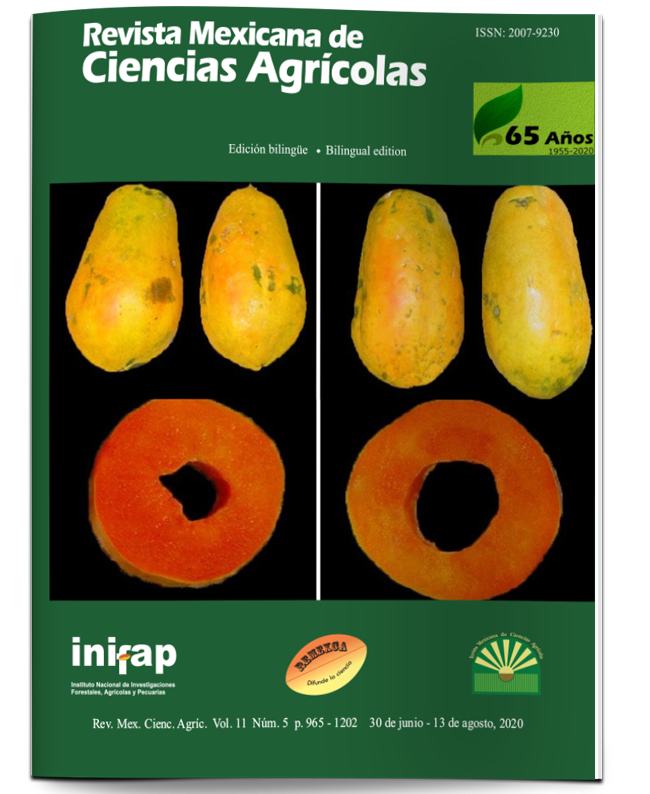Biological control of Lasiodiplodia theobromae and Fomitopsis meliae causing the regressive death of citrus
DOI:
https://doi.org/10.29312/remexca.v11i5.2272Keywords:
Fomitopsis meliae, Lasiodiplodia theobromae, antagonism, inhibitionAbstract
The research was carried out in the state of Nuevo León, Mexico, during 2018, with the aim of isolating and identifying strains of soil microorganisms and evaluating their antagonistic capacity in vitro against citrus pathogens Lasiodiplodia theobromae and Fomitopsis meliae. For the isolation of the microorganisms, 17 rhizosphere samplings were carried out in different locations and types of vegetation; the samples were heat treated and spread by extension in the potato dextrose agar culture medium added with 0.3% yeast extract and 0.3% malt extract (PDLMA). The isolates obtained were preliminarily evaluated by observation and growth comparison. Of 70 isolates, 15 presented antagonistic activity, which showed inhibition percentages of 39-91%. The actinomycete strains M4 R and M1-101, and the fungus M104 (Penicillium citrinum) caused 84,
91 and 85% inhibition respectively against L. theobromae and 83, 91 and 91% respectively against F. meliae. Isolation of bacteria was achieved, actinomycetes and fungi from the soil capable of inhibiting the growth of L. theobromae and F. meliae fungi causing regressive citrus death.
Downloads
Published
How to Cite
Issue
Section
License
Copyright (c) 2020 Revista Mexicana de Ciencias Agrícolas

This work is licensed under a Creative Commons Attribution-NonCommercial 4.0 International License.
The authors who publish in Revista Mexicana de Ciencias Agrícolas accept the following conditions:
In accordance with copyright laws, Revista Mexicana de Ciencias Agrícolas recognizes and respects the authors’ moral right and ownership of property rights which will be transferred to the journal for dissemination in open access. Invariably, all the authors have to sign a letter of transfer of property rights and of originality of the article to Instituto Nacional de Investigaciones Forestales, Agrícolas y Pecuarias (INIFAP) [National Institute of Forestry, Agricultural and Livestock Research]. The author(s) must pay a fee for the reception of articles before proceeding to editorial review.
All the texts published by Revista Mexicana de Ciencias Agrícolas —with no exception— are distributed under a Creative Commons License Attribution-NonCommercial 4.0 International (CC BY-NC 4.0), which allows third parties to use the publication as long as the work’s authorship and its first publication in this journal are mentioned.
The author(s) can enter into independent and additional contractual agreements for the nonexclusive distribution of the version of the article published in Revista Mexicana de Ciencias Agrícolas (for example include it into an institutional repository or publish it in a book) as long as it is clearly and explicitly indicated that the work was published for the first time in Revista Mexicana de Ciencias Agrícolas.
For all the above, the authors shall send the Letter-transfer of Property Rights for the first publication duly filled in and signed by the author(s). This form must be sent as a PDF file to: revista_atm@yahoo.com.mx; cienciasagricola@inifap.gob.mx; remexca2017@gmail.
This work is licensed under a Creative Commons Attribution-Noncommercial 4.0 International license.



